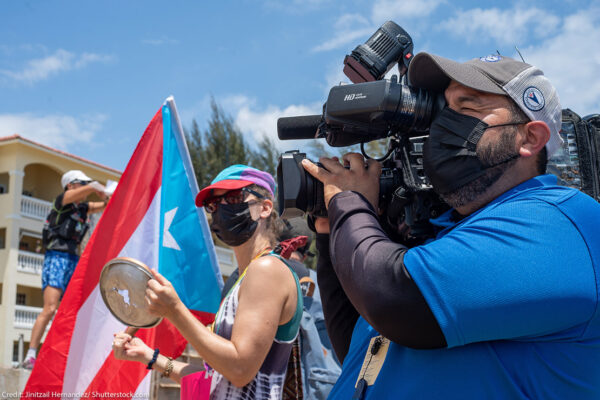ACLU of Southern California Stands Up for Anti-Sweatshop Advocates' Free Speech
FOR IMMEDIATE RELEASE
LOS ANGELES--In a lawsuit filed today, the American Civil Liberties Union of Southern California has taken up the defense of anti-sweatshop advocates wrongfully sued by national clothing retailer Forever 21 (also known as "Fashion 21"), for championing the cause of underpaid garment workers.
"This David-and-Goliath case serves as a reminder to all of us why freedom of speech is so vital," said ACLU of Southern California staff attorney Dan Tokaji. "The Garment Worker Center and other anti-sweatshop advocates are being sued for speaking out on behalf of low-wage immigrant workers. The ACLU will not allow wealthy interests to misuse the legal process in an effort to silence the voices of the poor and vulnerable."
The ACLU and a coalition of private attorneys and legal rights groups said that Forever 21's lawsuit is a classic example of a Strategic Lawsuit Against Public Participation, or "SLAPP" -- a bogus lawsuit brought by a well-financed entity to silence its critics. Such lawsuits have traditionally been filed with the intention of limiting free speech by taking energy and resources away from grassroots advocacy. California's anti-SLAPP law allows for such meritless lawsuits to be dismissed at an early stage.
At the crux of the case are the effects of a national boycott launched against Forever 21 last fall by anti-sweatshop advocates and workers. The public campaign against Forever 21 began after workers had spent months attempting to resolve their grievances against the company through negotiation. Forever 21 rejected the workers' demands that they be paid back wages and comply with labor laws. After Forever 21 refused to address their concerns, the workers filed a federal complaint, now up on appeal, with the help of the Asian Pacific American Legal Center.
"This SLAPP suit is Forever 21's feeble attempt to hide the real issues," said Kimi Lee, Executive Director of the Garment Worker Center a defendant in the Chang's libel suit and plaintiff in the ACLU's counter suit. "Forever 21 has the real power to clean up the factories that sew its clothes, but it has refused to do so. Forever 21 and all retailers must take responsibility for the garment workers that sew their clothes."
The ACLU lawsuit, Fashion 21 v. Garment Worker Center, alleges that the 19 workers sewed, trimmed, and pressed Forever 21 clothing in sweatshop conditions, and were not paid the minimum wage and/or overtime due them under state and federal law. The complaint also alleges that factories which produced Forever 21 clothing were infested with rats and cockroaches, were poorly ventilated, and had blocked fire exits. Supervisors at the factories also refused to provide workers with rest breaks.
Forever 21 is a large clothing retailer that was reportedly expected to earn $400 million in sales last year alone. The Los Angeles-based company operates with an estimated 95 percent of its production in the U.S. and a majority in Los Angeles.
On March 6, 2002, Forever 21 and its president Do Wong Chang sued anti-sweatshop advocates and 19 individual garment workers for libel, slander and other allegations of wrongdoing.
On April 5, the company dropped the 19 individual garment workers from being named in their lawsuit, but it has nevertheless has pressed on with its SLAPP against anti-sweatshop advocates. Representatives from the Garment Worker Center, Sweatshop Watch, and the Coalition for Humane Immigrant Rights are named in the lawsuit.
On April 22, the ACLU filed a motion to have Forever 21's lawsuit against the advocates thrown out. That motion is scheduled to be heard on June 10, 2002 in Los Angeles Superior Court.
"We wouldn't be able to fight for justice from Forever 21 without the Garment Worker Center, CHIRLA, and Sweatshop Watch," said Lucy Chavac, one of the 19 garment workers originally named in the SLAPP suit. "We believe that Forever 21 needs to dismiss this lawsuit against them and instead take responsibility for the conditions in the factories that sew its clothes."
Carol Sobel is the ACLU cooperating attorney handling the counter-SLAPP suit. Attorneys from the Asian Pacific American Legal Center and the law firms of Newman, Aaronson & Vanaman and Loeb & Loeb are serving as co-counsels in this case.
The legal complaint is online at:
/Files/Files.cfm?ID=10395&c=184


